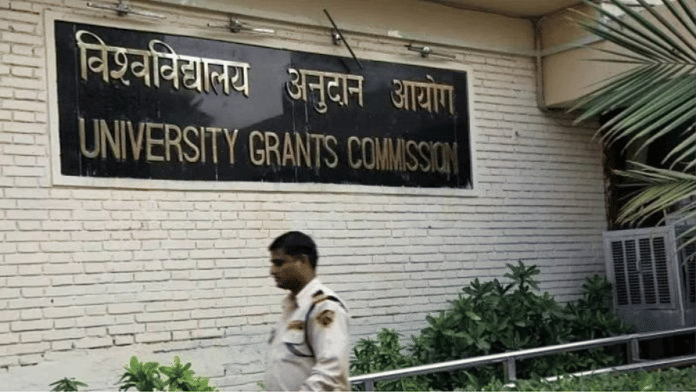New Delhi: The Centre has constituted a committee of experts to review the draft curriculum released by the University Grants Commission (UGC) for various subjects, following allegations of factual inaccuracies and inclusion of outdated topics, ThePrint has learnt.
The UGC released the draft curriculum in August, aligned with the Learning Outcomes-based Curriculum Framework (LOCF) under the National Education Policy (NEP) 2020, for undergraduate courses in nine subjects including Political Science, Mathematics, Chemistry, Commerce, Economics and Geography.
The drafts, particularly the one for Mathematics, have drawn criticism from sections of the academia. Last month, more than 900 mathematicians and academics signed a petition, addressed to higher education secretary Vineet Joshi, urging the UGC to withdraw the draft curriculum, submitting that it was “riddled with grave defects”.
They cautioned that its adoption could harm the academic prospects of future generations.
As ThePrint reported on 23 August, the UGC in its draft undergraduate mathematics curriculum proposed the inclusion of ancient Indian concepts such as sutra-based arithmetic and algebra, ‘kala ganana’ (time calculation), ‘Bharatiya innovations’, and geometry derived from the Shulva Sutras of the Vedic period.
In their petition, the academics said there was a presence of outdated courses such as analytical geometry and mechanics in the draft curriculum.
According to a senior government official, the draft curriculum serves as a guideline rather than a mandatory regulation for universities. “However, since we have received suggestions on it, a committee of high-level experts has been constituted to review both the draft and the feedback,” the official told ThePrint.
Adding, “The committee will consult the experts who developed the draft curriculum as we are confident they have their own rationale for including certain topics.”
The UGC draft curriculum has also been facing opposition from various states.
Last week, a panel constituted by the Kerala government flagged what it called the “imposition of ideologically driven content under the guise of the Indian Knowledge System,” inclusion of “outdated material”, and “violations” of academic autonomy.
Based on the panel’s report, the Kerala government rejected the draft curriculum and communicated its decision to the UGC.
In August, the Karnataka government announced that it would not adopt the UGC’s draft curriculum, describing it as an attempt to impose ideological content and undermine the federal structure of the education system.
Senior central government officials, however, emphasised the draft is not mandatory. “States are free to make their own decisions since education is a concurrent subject. There is no way the UGC curriculum will be imposed on them,” the official quoted above said.
(Edited by Ajeet Tiwari)
Also Read: UGC draft norms for recruiting V-Cs: Political implications & why there’s resistance from academia







Yes, in yoga course which are to be learned through offline mode are allowed ro conducted through online .
I can see , one person for each street is with yoga degree or diploma without any knowledge about yoga or firness and conducting classes.
Same.like physical education and sports sciences course are also conductedin irregular mode and part time mode with the support of TNPESU faculty becausetherealso classes are conductedlike that only , which should be given at most important.